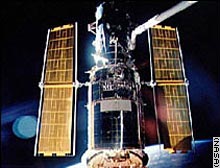Amit Oren

Direct link to this page: https://www.hayadan.org.il/hubble290405.html
The person in charge of the science missions of the Hubble Space Telescope asked the new director of NASA to find the money to finance one last mission for the observatory.
Dr. Stephen Beckwith told BBC News that the cost of such a mission would not be high for the American space agency, but this investment would lead to many important scientific discoveries.
This week, NASA is marking 15 years since the operation of the Hubble Space Telescope, whose stunning images changed the way we understand the universe.
Among its many important achievements, the telescope allowed us to calculate the age of the universe and confirm the existence of black holes. But this piece of satellite hardware needs regular maintenance, and if you don't get it soon - it may stop working within three years.
These days, NASA is not ready to risk a manned shuttle flight for this upgrade work and is saving budgets that will only be sufficient to bring the telescope safely to Israel at the end of its mission - when it arrives.
But Dr. Beckwith, director of the Space Telescope Science Institute (STScI), which operates Hubble, believes that this is a wrong decision. "Hubble's budget is less than one and a half percent of NASA's annual expenses in the field of space - I think it's 'small money.' "I don't think that the costs of keeping the Hubble in operation should be a major factor for the agency, given the high profile that the Hubble has both in terms of its scientific achievements and thanks to the good public relations it brings to it.
"'Hubble' is NASA's best mission right now. He produces beautiful science that the public loves and makes us all look great.” says Beckwith.
political priority
NASA's problem, however, is that its political priority is to develop President Bush's ambitious plan to send people back to the moon, and then to Mars.
Therefore, when the shuttle does return to flight, all missions will be aimed at compensating for the lost time in the construction of the International Space Station (ISS - International Space Station) - as a first step towards human exploration of the near solar system.
This means that less money will be allocated to simple science programs. NASA's reasoning was that it should invest its limited resources in building and sending new observatories, such as the James Webb telescope. This telescope will probably be launched at the beginning of the next decade and will focus on observing the universe at infrared wavelengths.
But Dr. Beckwith claimed that it is an economically wrong decision to take down the 'Hubble' now." Of course, we do want to create new missions and we will build bigger and better telescopes. The question of when to stop using a telescope is related to whether it is still in its prime or has already come of age.
"Grieving is still in its infancy. In fact, with two new devices planned for the next maintenance and upgrade mission, it will be better than ever once upgraded.” Dr. Beckwith feels that the telescope does not lack "scientific kilometers" left for research.
Cosmic acceleration
Beckwith sees two specific research topics that will yield results. The first is the continuation of the observations on the expansion of the universe, and especially - its acceleration. 'Hubble' helped show that the acceleration came in response to some unknown force known as "dark energy". Dr. Beckwith said that his age saw this as "certainly the most important discovery in physics in the last 100 years".
A few more years of research, he believes, and we will have a very good idea of the role of dark energy in the universe.
Dr. Beckwith also thinks that Hubble is uniquely positioned to search for extrasolar planets and even to assess their potential to allow conditions suitable for life.
"This is the only observatory that has been able to examine the atmospheric chemistry of a planet outside the solar system - so we are starting to study the chemistry of these planets, which is absolutely necessary to find out if life exists on them."
But there is some hope for Hubble fans. The new director of NASA, Dr. Mike Griffin (Griffin), promised to go through with the decision not to service the telescope - provided that the return of the shuttle flight continues as planned.
The Hubble may still get its upgrade and... life extension.
For news at the BBC
He knew the fate of the mourner
https://www.hayadan.org.il/BuildaGate4/general2/data_card.php?Cat=~~~146131584~~~210&SiteName=hayadan
